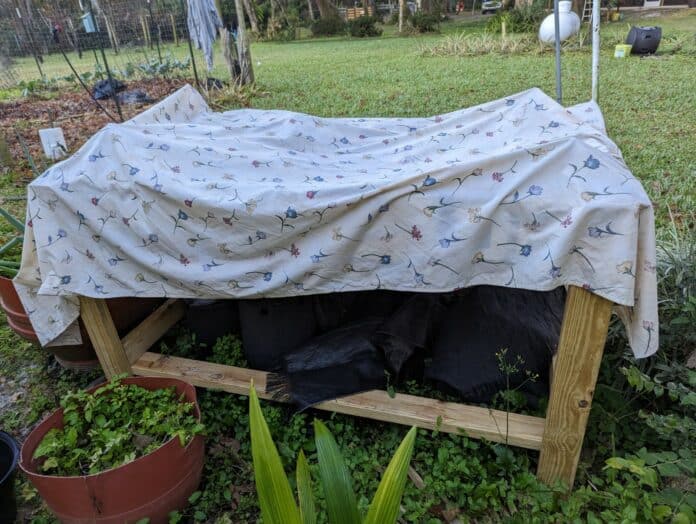You may have noticed that the weather can be unpredictable at times here in Hernando County, especially during the winter months. One minute it’s warm and sunny, and the next it’s cold and rainy. This can be especially problematic for your vegetable garden, as cold temperatures can damage or kill your plants. Here are some simple measures you can take to protect your vegetable garden from the cold in Central Florida.
One of the most effective ways to protect your vegetable garden from cold temperatures is to use a floating row cover. This is a lightweight, semi-transparent fabric that is placed over the top of your plants and secured to the ground with stakes or weights. The row cover acts as a protective barrier against the cold, trapping heat and moisture around the plants to keep them warm. It also protects against frost, wind, and insects.
Another option is to use old sheets or blankets to cover your plants. Be sure to secure the covering to the ground to prevent it from blowing away in the wind. If you live in a particularly cold area, you may want to consider using multiple layers of covering to provide extra insulation. Just be sure to remove the covering during the day to allow sunlight to reach your plants and avoid overheating.
In addition to using physical barriers to protect your plants, you can also take steps to improve the overall health of your garden. This can help your plants to better withstand cold temperatures and recover more quickly if they are damaged. Some things you can do include:
Mulching your garden beds with a thick layer of organic material, such as leaves or straw. This helps to insulate the soil and retain moisture.
Watering your plants regularly, especially during dry spells. This helps to keep the soil moist, which can help your plants to tolerate cold temperatures more easily.
Adding compost or other organic matter to your soil to improve its structure and fertility. This can help your plants to grow stronger and more resilient and the organic matter holds the heat better on a cold night.
Finally, it’s a good idea to pay attention to the weather forecast and be prepared for sudden drops in temperature. If you know that a cold front is coming, you can take extra precautions to protect your garden, such as adding extra layers of covering or moving sensitive plants indoors. By following these simple steps, you can help to keep your Central Florida vegetable garden healthy and productive throughout the winter months.
Your University of Florida Extension Office in Hernando County is here to help answer all your lawn and garden questions. If you have specific questions, feel free to send an email with pictures to [email protected] or follow us on Facebook at www.facebook.com/HernandoExt to find out about all our upcoming activities.
UF/IFAS Extension Hernando County is a free service that provides solutions for your life.Extension programs are open to all persons without regard to race, color, sex, age, disability, religion, or national origin.
The Institute of Food and Agricultural Sciences (IFAS) is an Equal Opportunity Institution authorized to provide research, educational information and other services only to individuals and institutions that function with non-discrimination with respect to race, creed, color, religion, age, disability, sex, sexual orientation, marital status, national origin, political opinions or affiliations. For more information on obtaining other UF/IFAS Extension publications, contact your county’s UF/IFAS Extension office. U.S. Department of Agriculture, UF/IFAS Extension Service, University of Florida, IFAS, Florida A & M University Cooperative Extension Program, and Boards of County Commissioners Cooperating. Dr. Andre Johnson, dean for UF/IFAS Extension.

